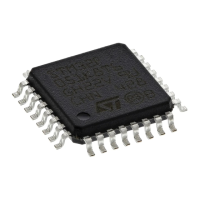General-purpose I/Os (GPIO) RM0091
118/742 Doc ID 018940 Rev 1
8 General-purpose I/Os (GPIO)
8.1 GPIO introduction
Each general-purpose I/O port has four 32-bit configuration registers (GPIOx_MODER,
GPIOx_OTYPER, GPIOx_OSPEEDR and GPIOx_PUPDR), two 32-bit data registers
(GPIOx_IDR and GPIOx_ODR), a 32-bit set/reset register (GPIOx_BSRR), a 32-bit locking
register (GPIOx_LCKR) and two 32-bit alternate function selection registers (GPIOx_AFRH
and GPIOx_AFRL).
8.2 GPIO main features
● Output states: push-pull or open drain + pull-up/down
● Output data from output data register (GPIOx_ODR) or peripheral (alternate function
output)
● Speed selection for each I/O
● Input states: floating, pull-up/down, analog
● Input data to input data register (GPIOx_IDR) or peripheral (alternate function input)
● Bit set and reset register (GPIOx_BSRR) for bitwise write access to GPIOx_ODR
● Locking mechanism (GPIOx_LCKR) provided to freeze the port A or B I/O configuration
● Analog function
● Alternate function selection registers for ports A and B (at most 16 AFs possible per
I/O)
● Fast toggle capable of changing every two clock cycles
● Highly flexible pin multiplexing allows the use of I/O pins as GPIOs or as one of several
peripheral functions
8.3 GPIO functional description
Subject to the specific hardware characteristics of each I/O port listed in the datasheet, each
port bit of the general-purpose I/O (GPIO) ports can be individually configured by software
in several modes:
● Input floating
● Input pull-up
● Input-pull-down
● Analog
● Output open-drain with pull-up or pull-down capability
● Output push-pull with pull-up or pull-down capability
● Alternate function push-pull with pull-up or pull-down capability
● Alternate function open-drain with pull-up or pull-down capability
Each I/O port bit is freely programmable, however the I/O port registers have to be accessed
as 32-bit words, half-words or bytes. The purpose of the GPIOx_BSRR register is to allow
atomic read/modify accesses to any of the GPIO registers. In this way, there is no risk of an
IRQ occurring between the read and the modify access.

